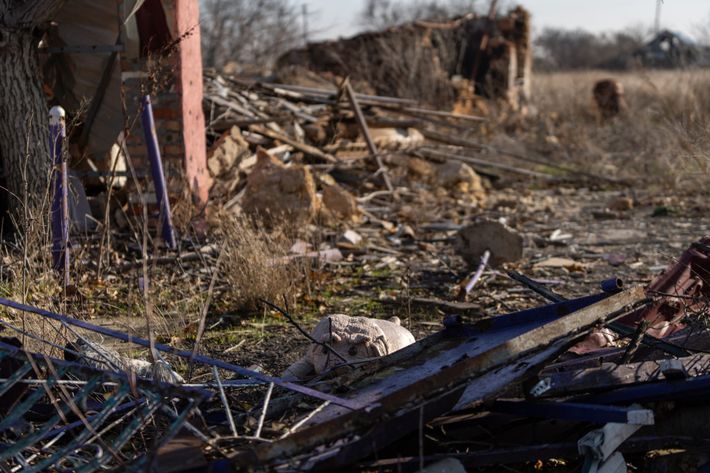How do you describe war to those who haven’t experienced it themselves?
That’s a question 37-year-old Kateryna has been reflecting on. She has been closer to the war in Ukraine than most. First, she endured eight months of occupation. Then, she lived near the front line for a year, until one day, while on the bus, she was hit by an artillery shell. She has undergone around 40 surgeries and still has about five more to go. She has been hospitalized and in rehabilitation for 10 months. She has had severe infections from her injuries.
Today, she sits in an apartment in Mykolaiv with her eight-year-old daughter Sonia and her husband, a sailor who is now unemployed. After a while, Kateryna responds to the question about how to describe war.
“I remember some years ago, one of my mother’s friends from the Donbas came to visit us in Kherson. She had fled from the war that broke out in 2014. She showed us pictures from there of the destruction. We could see what was happening in the pictures, but we couldn’t understand it. We thought we understood, but we didn’t. You can’t feel the heat from burning houses in pictures. You can’t convey the feelings of living without power for months. It’s impossible to show the fear when people are being shot on the streets, and you’re hoping you’re not the next to be dragged out of the basement where you’ve sought refuge. How do you describe being so close to death?” says Kateryna.

Support to civilian victims of war
The Ukrainian legal rights organisation Right to Protection in partnership with DCA-NCA, and supported by the European Union (EU), has helped Kateryna apply for financial assistance and compensation, registered her for humanitarian aid, and coordinated visits to social services to get further support for herself and her family. Additionally, she has received financial aid to purchase an exercise bike for daily physical rehabilitation.
“I didn’t know how many documents I needed to get the support I needed. I didn’t know Mykolaiv that well, and I didn’t know how to apply for the correct status to get benefits and compensation, which allows my family to rebuild our lives,” says Kateryna.

Her story is, unfortunately, far from unique. According to the Office of the United Nations High Commissioner for Human Rights (OHCHR) at least 12,340 civilians have been killed and 27,836 injured in Ukraine since 24 February 2022. The partnership between DCA-NCA and Right to Protection has supported over 300 people in navigating the system of compensation and acquiring the correct status after an injury or having their property damaged as a consequence of the war. Many Ukrainians, like Kateryna, face challenges in gaining recognition as war victims or displaced persons to access aid, rebuild homes, or receive medical assistance. Right to Protection provides legal aid, helps restore lost documents, and guides people through complex bureaucracy to secure the support they need.
Air alarms provoke painful memories
Even though Kateryna and her family are further away from the battlefield now, there are still clear scars on them that affect their daily lives. The physical scars are evident on Kateryna, who is missing parts of her left hand and left leg, making it difficult for her to move around the apartment. She tries to improve by using her exercise bike two to three times a day, but there is a long way to go, she says.
The psychological scars are evident in her daughter, Sonia, who begins to scream and cry whenever she hears an air raid siren or an explosion. These are not few in Mykolaiv.
“Sonia is seeing a psychologist, but it’s hard to heal the wounds she has on her soul. Children get more worried than adults, but the war has changed us all,” says Kateryna.

The challenges Kateryna and her family face have deeply impacted their lives, but they are determined to move forward. Right to Protection case manager Katia has been indispensable, assisting them in registering as war victims, securing cash assistance, and accessing humanitarian aid after both Kateryna and her husband lost their jobs. With Katia’s support and guidance, the family’s path to recovery has become less overwhelming, allowing them to focus on healing and rebuilding their future.
“Katia (case manager from Right to Protection, ed.) has been invaluable. She finds solutions for us, where we have not been able to find any. That is helping me and my family recover,” she says.


